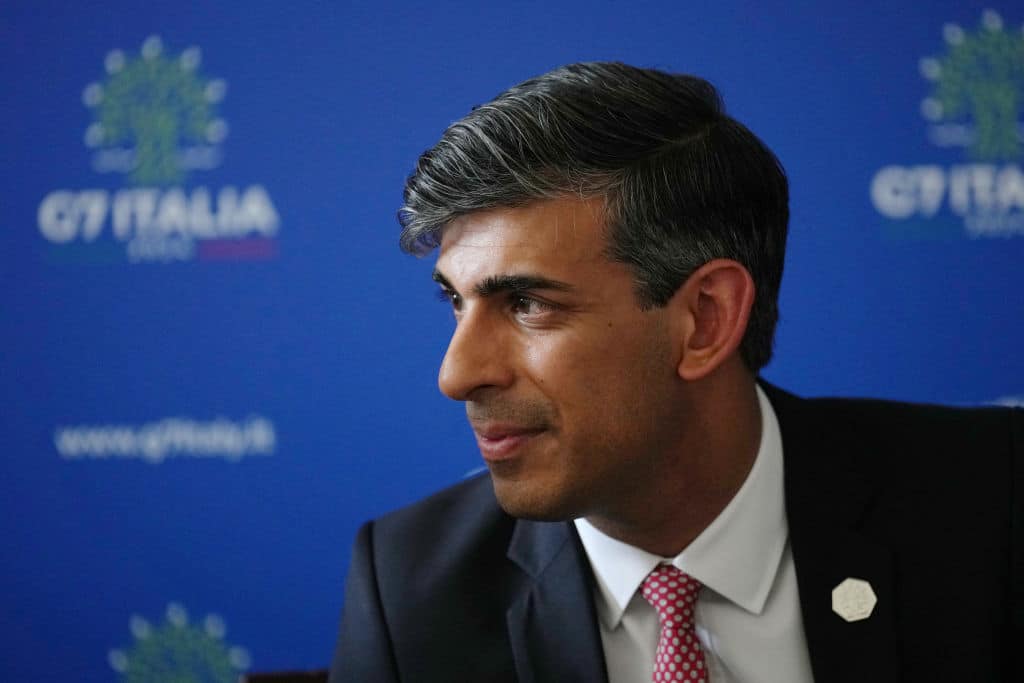Both leaders of the UK’s two largest political parties have now indicated that they personally do not oppose assisted dying, given recent remarks made by the serving Prime Minister.
During the G7 summit, Rishi Sunak said he is not opposed to assisted dying – which is also known as assisted suicide, especially among those opposed to changing the law on it – as long as there are safeguards to protect the vulnerable and ensure no one is pressurised into killing themselves, <a href="https://www.telegraph.co.uk/politics/2024/06/16/rishi-sunak-not-opposed-assisted-dying-safeguards/"><mark style="background-color:rgba(0, 0, 0, 0)" class="has-inline-color has-vivid-cyan-blue-color">reports</mark></a> the <em>Daily Telegrap</em>h, the UK's leading broadsheet newspaper.
Until now, the Prime Minister has not made his personal position clear on assisted dying, while Sir Keir Starmer, leader of the opposition Labour Party and who is odds on favourite to replace Sunak as Prime Minister at the forthcoming UK General Election on 4 July, has already made clear his <a href="https://catholicherald.co.uk/labour-leader-keir-starmer-commits-to-assisted-suicide-vote-if-prime-minister/"><mark style="background-color:rgba(0, 0, 0, 0)" class="has-inline-color has-vivid-cyan-blue-color">even firmer support for a change to the law</mark></a> and the way the country handles assisted dying.
“I’m not against it in principle,” Sunak said when speaking to reporters in Italy where he was attending the G7 summit running<strong> </strong>13-15 June 2024. “It’s just a question of having the safeguards in place.”
The Prime Minister has already pledged to make parliamentary time for a free vote on changing the law to allow doctors to assist people to die, but the comments at the G7 represents a further step given the expression of his personal stance, in addition to the overall approach by his party. <br><br>“The manifesto has language on this which is very clear: we will support what Parliament does – these matters are always an issue of conscience, of course – if Parliament wants to decide they want to facilitate it," Sunak said.
"I’m not opposed to it, in principle, and it’s a question of making sure the safeguards are in place and are effective. That’s always been the conversation and the debate in the past and that’s where people have had questions in the past.”
As a result, the UK Prime Minister appears roughly aligned with Starmer on the issue, though the latter has been even more public and clear about his position. In 2015, Starmer voted for assisted dying in the Commons, and more recently he has stated his personal commitment to changing the law on assisted suicide, promising to bring forward a Bill to legalise the practice if he is elected Prime Minister in the forthcoming General Election.
The <em>Telegraph</em> notes that the news of Sunak's latest comments was welcomed by Dame Esther Rantzen, who has become a <a href="https://catholicherald.co.uk/the-terrible-truth-about-assisted-dying-lessons-from-canada-and-australia/"><mark style="background-color:rgba(0, 0, 0, 0)" class="has-inline-color has-vivid-cyan-blue-color">figurehead for the campaign to change UK law on assisted dying</mark></a>:
“What terrific news, in these polarised times, that the two leaders of the biggest parties both believe that the next Parliament must have the opportunity to debate this life-and-death issue,” Rantzen said.
Sarah Wootton, chief executive of Dignity in Dying, highlights that “[i]t is hugely significant that both the Prime Minister and the Leader of the Opposition have promised they would make time for a proper debate and vote on assisted dying, and that neither are opposed to reform.<br><br>“It’s clear that assisted dying is high on the political agenda and this debate is on the table no matter who leads our next government."
She concludes: “This is a watershed general election for dying people, many of whom will be casting their final vote and will give it to candidates who are on the side of compassionate choice...Assisted dying is a movement whose time has come.”
Others, however, argue that the Prime Minister’s comments do not mean his position on assisted suicide has changed.
“These new comments do not reflect a change in his stance,” Dr Gordon Macdonald, chief executive of Care Not Killing, told the <em>Telegraph</em>. “What they do show is he recognises the difficulty in drafting robust legislation on this issue, because of what we see in the handful of jurisdictions that have introduced state-assisted killing."
Drawing on such examples where assisted dying has been legalised by the State, Professor David Albert Jones, director of the Oxford-based Anscombe Bioethics Centre, states in an <a href="https://www.conservativewoman.co.uk/starmer-and-itv-ignore-the-horrific-facts-about-assisted-dying/"><mark style="background-color:rgba(0, 0, 0, 0)" class="has-inline-color has-vivid-cyan-blue-color">article</mark></a> for <em>The Conservative Woman</em>:
<mark style="background-color:rgba(0, 0, 0, 0)" class="has-inline-color has-black-color">“There is ample evidence of adverse effects in these countries: people having their lives ended without consent; increases in unassisted suicide; people being refused assisted living but offered 'assisted dying'; people seeking death not because of physical suffering but because they feel a burden to others.</mark>"
He adds: "There are many problems in end-of-life care but legalising assisted suicide would not solve these problems and changing the law in this way would further endanger many vulnerable people.”
The apparent increasing momentum behind calls for legislative changes over assisted dying, and which <a href="https://catholicherald.co.uk/the-bbc-is-drip-feeding-assisted-dying-propaganda-into-our-living-rooms/"><mark style="background-color:rgba(0, 0, 0, 0)" class="has-inline-color has-vivid-cyan-blue-color">goes back more than a decade now</mark></a>, has drawn a robust response from parts of the Catholic Church in the UK.
The Bishop of Shrewsbury has said that <a href="https://catholicherald.co.uk/bishop-mark-davies-catholics-must-vote-to-stop-creeping-culture-of-death/"><mark style="background-color:rgba(0, 0, 0, 0)" class="has-inline-color has-vivid-cyan-blue-color">Catholics should use their votes</mark></a> at the General Election to stop assisted suicide and euthanasia becoming law. In a statement to the faithful of his diocese, Bishop Mark Davies described so-called “assisted dying” as a central issue of the July 4th poll.
He urged Catholics to question all prospective parliamentary candidates about their position before they cast their vote.
Bishop Davies warns that the lives of the weak and the vulnerable, and the integrity of medical ethics are at stake amid a <a href="https://catholicherald.co.uk/englands-christian-inheritance-at-stake-in-uk-general-election/"><mark style="background-color:rgba(0, 0, 0, 0)" class="has-inline-color has-vivid-cyan-blue-color">general threat to</mark></a> England's "Christian Inheritance". <br><br><em>Photo: British Prime Minister Rishi Sunak conducts a media conference during day one of the 50th G7 summit in Fasano, Italy, 13 June 2024 . The G7 summit in Puglia, hosted by Italian Prime Minister Giorgia Meloni, the seventh held in Italy, gathers leaders from the seven member states, the EU Council, and the EU Commission. Discussions will focus on topics including Africa, climate change, development, the Middle East, Ukraine, migration, Indo-Pacific economic security and artificial intelligence. (Photo by Christopher Furlong/Getty Images.)</em>



